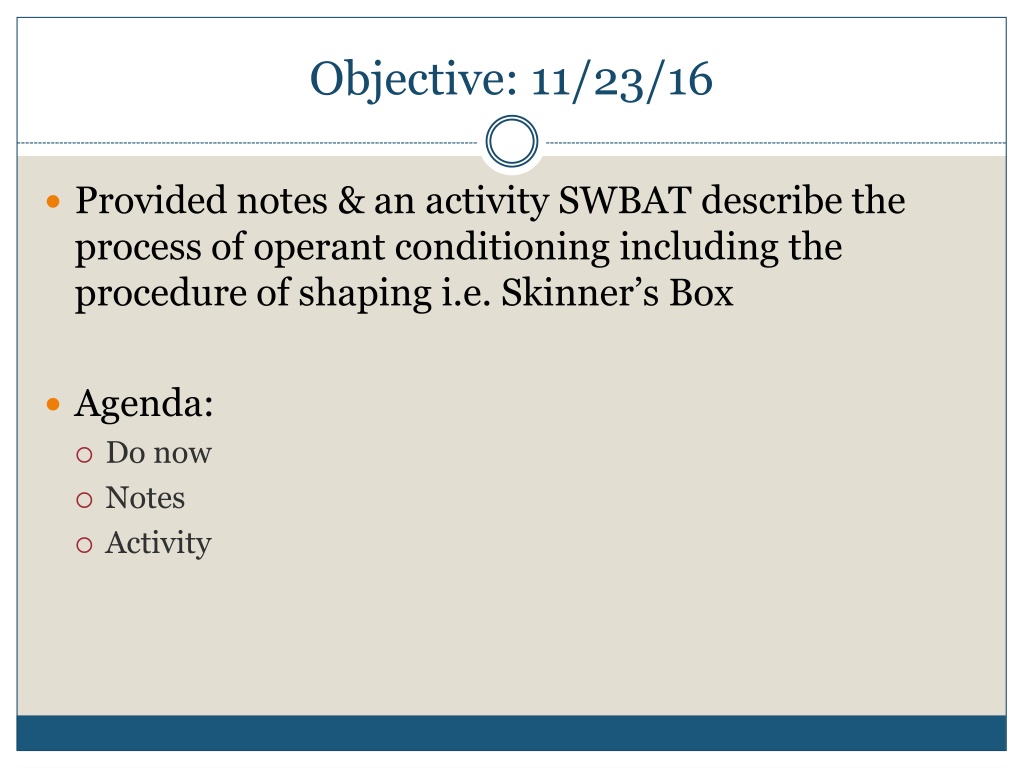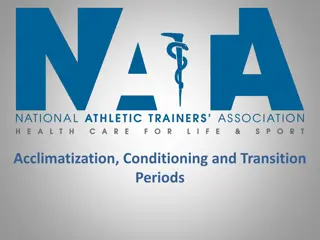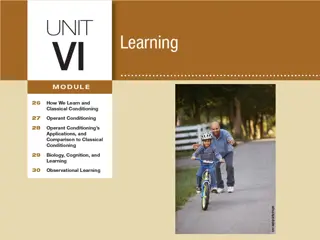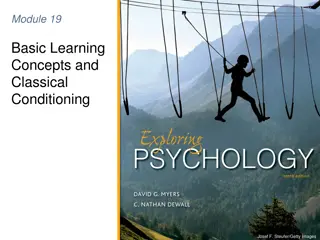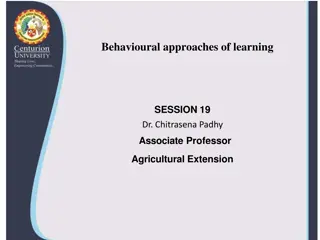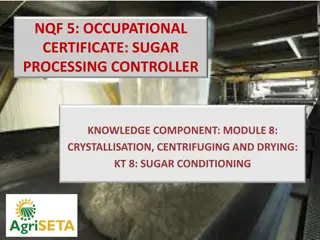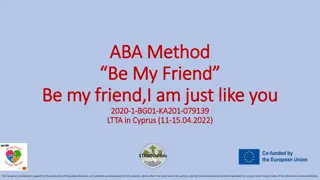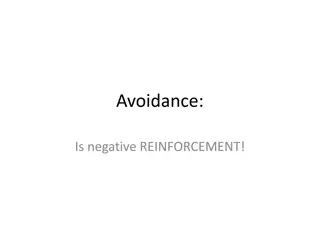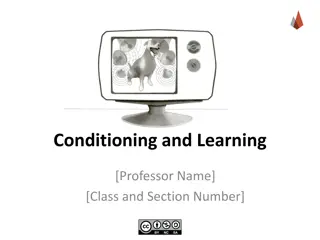Understanding Operant Conditioning: The Process and Importance
Operant conditioning is a type of learning where behavior is influenced by its consequences. This process, famously studied by B.F. Skinner, involves shaping behavior through reinforcement or punishment. By understanding how behaviors are reinforced or diminished, we can better comprehend how voluntary actions are influenced in various settings.
Download Presentation

Please find below an Image/Link to download the presentation.
The content on the website is provided AS IS for your information and personal use only. It may not be sold, licensed, or shared on other websites without obtaining consent from the author. Download presentation by click this link. If you encounter any issues during the download, it is possible that the publisher has removed the file from their server.
E N D
Presentation Transcript
Objective: 11/23/16 Provided notes & an activity SWBAT describe the process of operant conditioning including the procedure of shaping i.e. Skinner s Box Agenda: Do now Notes Activity
Introductory Psychology: Learning Learning is when you learn something ? AP PSYCHOLOGY: UNIT 5
Do Now: Classical Conditioning Review Worksheet
Learning: Operant Conditioning PART ONE What s in it for me?
Learning: Operant Conditioning Operant Conditioning A type of learning in which the frequency of a behavior depends on the consequence that follows the behavior; deals with voluntary behaviors Frequency increases if the consequence is reinforcing Frequency decreases if the consequence is not reinforcing
Daughter Mother Behavior: Screaming tantrum Behavior: Give candy Consequence: Receiving a candy bar Consequence: Screaming tantrum ends Result: Result: More tantrums in the future More candy buying in the future
Learning: Operant Conditioning The Law of Effect (Edward Thorndike) Behaviors with favorable consequences will occur more frequently; behaviors with unfavorable consequences will occur less frequently Hungry cats in puzzle boxes? Provides the basis for learning voluntary behaviors
The cat is placed in the box with the food reward outside Although learning is NOT immediate, the hungry cat eventually learns that pressing the lever will result in getting out of the box and being able to reach the food Escape GOOD! Thorndike s Puzzle Box Food EVEN BETTER!
Learning: Operant Conditioning B.F. Skinner (1904-1990) The Behaviorist s Behaviorist Developed the fundamental principles & techniques of operant conditioning Voluntary behavior is what people & animals do to operate in the world Coined the term operant
Learning: Operant Conditioning Designed the Skinner Box, or operant chamber to study operant conditioning Has a lever/key that an animal manipulates in order to obtain a reinforcer like food or water The lever/key is connected to devices that record the animal s response
Skinners Pigeons During WWII, Skinner trained pigeons to guide missiles to their targets; however, the military didn t buy into his ideas These animals were muchmore effective than humans at identifying their targets Humans: 38% accuracy Pigeons: 93% accuracy
Learning: Operant Conditioning Reinforcement Any event or stimulus that, when following a response, increases the probability that the response will occur again Primary Reinforcer Naturally reinforces by meeting a basic biological need Hunger, thirst, touch, etc. Secondary Reinforcer Becomes reinforcing when paired with a primary reinforcer (in the past) or when we have learned to value it Praise, gold stars, tokens, etc.
Learning: Operant Conditioning Positive Reinforcement The reinforcement of a response by the addition or experiencing of a pleasurable stimulus The subject receives something they want/desire Called an APPETITIVE STIMULUS Increases the likelihood of the behavior; strengthens the behavior
Learning: Operant Conditioning Negative Reinforcement The reinforcement of a response by the removal, escape from, or avoidance of an unpleasant stimulus Something the subject doesn t like is removed Called an AVERSIVE STIMULUS Increases the likelihood of the behavior; strengthens the behavior
Learning: Operant Conditioning Punishment Any event or object that, when following a response, makes that response less likely to happen again The OPPOSITE of reinforcement Decreases the likelihood of the behavior; weakens the behavior
Learning: Operant Conditioning Punishment by Application The punishment of a response by the addition or experiencing of an unpleasant stimulus Also known as positive punishment Examples Spanking, scolding, etc.
Learning: Operant Conditioning Punishment by Removal The punishment of a response by the removal of a pleasurable stimulus Also known as negative punishment or omission training Examples Grounding, time-out, fining, etc.
Learning: Operant Conditioning Problems with punishment Severe punishment May cause the child to avoid the punisher instead of the behavior being punished May encourage lying Creates fear, anxiety, low self-esteem and emotional responses that do not promote learning Can lead to increased aggression Can lead to abuse
Learning: Operant Conditioning To make punishment more effective Punishment should immediately follow the behavior it is meant to punish Punishment should be consistent Follow through with promises of punishment Same intensity or slight increase, but never decrease Punishment of the wrong behavior should be paired, whenever possible, with reinforcement of the right behavior
Learning: Operant Conditioning Shaping A technique used to establish a behavior that otherwise probably wouldn t happen Involves the reinforcement of behaviors that are increasingly similar to the desired outcome Animal tricks Learning to ride a bike without training wheels
Learning: Operant Conditioning Stimulus Generalization Dada example Stimulus Discrimination Involves reinforcement or the absence of reinforcement in the case of generalization Extinction Involves the removal of reinforcement Spontaneous Recovery
Learning: Operant Conditioning Schedules of Reinforcement The timing of reinforcement can make a HUGE difference in the speed at which learning occurs and the strength of the learned response Skinner found that reinforcing each & every response was not necessarily the best schedule of reinforcement for long-lasting learning
Learning: Operant Conditioning Continuous Reinforcement The reinforcement of each & every correct response Behavior is Established very quickly Very likely to be extinguished once reinforcement stops Examples Vending machines Dog training
Learning: Operant Conditioning Partial Reinforcement The reinforcement of some, but not all, correct responses Behavior is Established more gradually Very resistant to extinction Example Lottery Tickets Patterns of Partial Reinforcement Fixed-interval & variable-interval Fixed-ratio & variable-ratio
Learning: Operant Conditioning Fixed-Interval Schedule A schedule of reinforcement in which the interval of time that must pass before reinforcement becomes possible is always the same Examples Monthly paycheck Studying hardest just before the test (assuming that you know when the test is going to be given) Pre-dentist teeth cleaning extravaganza
Learning: Operant Conditioning Variable-Interval Schedule A schedule of reinforcement in which the interval of time that must pass before reinforcement becomes possible is different for each trial or event Examples Fishing Pop quizzes Calling a radio station
Learning: Operant Conditioning Fixed-Ratio Schedule A schedule of reinforcement in which the number of responses required for reinforcement is always the same Examples Planet Smoothie Punch Cards A salesperson receives a bonus for every 10th gym membership sold
Learning: Operant Conditioning Variable-Ratio Schedule A schedule of reinforcement in which the number of responses required for reinforcement is different for each trial or event Examples Slot machines Lottery tickets
Learning: Operant Conditioning Edward Tolman (1930) Latent Learning Learning that is not apparent from behavior when it first occurs Tolman s Maze Experiment Maze-Running Rats Significance?
Learning: Operant Conditioning Martin Seligman (1967) Learned Helplessness The tendency to fail to act to escape from a situation because of a history of repeated failures in the past Seligman s Dog Experiment Depressed Dogs Significance?
Learning: Operant Conditioning Wolfgang K hler (1925) Insight Learning The sudden perception of relationships among various parts of a problem, allowing the solution to the problem to come quickly K hler s Chimpanzee Experiment Smart Chimps Significance?
